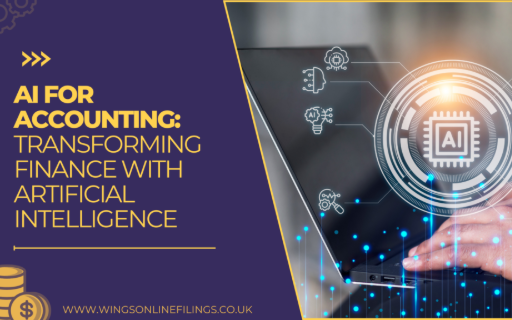Introduction
In the fast-paced world of finance and accounting, staying competitive and efficient is paramount. As businesses continue to grow and adapt to the ever-evolving economic landscape, the demand for accurate, timely, and insightful financial data has never been greater. This is where the transformative power of Artificial Intelligence (AI) for accounting comes into play. In this blog, we’ll explore the various ways in which AI is revolutionizing the accounting industry, from automating repetitive tasks to providing valuable insights for strategic decision-making.
Understanding AI for Accounting
Before diving into the specifics of how AI is changing the field of accounting, let’s start with a brief overview of what AI actually is. AI, or Artificial Intelligence, refers to the development of computer systems that can perform tasks that typically require human intelligence. These tasks encompass a wide range of activities, from speech and image recognition to problem-solving and decision-making. In the context of accounting, AI is harnessed to automate routine and repetitive tasks, thereby enhancing accuracy and freeing up accountants to focus on more value-added activities.
AI-Powered Automation
One of the most significant advantages of using AI in accounting is the automation of repetitive tasks. Historically, accountants have spent a substantial amount of time on data entry, transaction reconciliation, and invoice processing. These tasks are not only time-consuming but also prone to human error. AI-driven solutions can streamline these processes by automatically capturing and categorizing financial data, reducing the risk of costly mistakes.
For example, AI-powered Optical Character Recognition (OCR) technology can quickly extract data from invoices and receipts, eliminating the need for manual data entry. This not only saves time but also enhances accuracy, reducing the likelihood of errors that can lead to financial discrepancies.
Enhanced Fraud Detection
Accounting professionals are often tasked with identifying irregularities and potential fraud within financial data. Traditional methods of fraud detection are heavily reliant on historical data analysis and pattern recognition, which can be time-consuming and less accurate. AI, on the other hand, excels in this area.
AI-driven fraud detection systems can analyze vast datasets in real-time, identifying unusual patterns or transactions that may indicate fraudulent activities. By using machine learning algorithms, these systems can adapt and evolve as new fraud tactics emerge, making them more effective in safeguarding an organization’s financial assets.
Efficient Financial Forecasting
Accurate financial forecasting is crucial for businesses to plan for the future, secure funding, and make informed decisions. AI has revolutionized this aspect of accounting by offering predictive analytics and forecasting capabilities. Machine learning algorithms can analyze historical financial data, market trends, and a variety of other variables to generate highly accurate forecasts.
AI’s ability to process and analyze massive datasets enables organizations to develop more precise financial models and make data-driven predictions. This can be invaluable for budgeting, investment strategies, and risk management, allowing businesses to make more informed decisions in an ever-changing financial landscape.
Real-time Reporting and Analysis
AI empowers accountants and finance professionals to move beyond traditional, periodic financial reporting. With AI-powered accounting systems, real-time reporting and analysis become feasible. This means that organizations can access up-to-the-minute financial insights, allowing them to respond promptly to market changes, identify cost-saving opportunities, and assess the impact of their strategic decisions.
Real-time financial reporting also enhances collaboration and transparency within organizations. When all stakeholders have access to the most current financial information, they can make informed decisions more effectively and work together to achieve common financial goals.
Improving Compliance and Regulatory Adherence
Accounting is a field known for its strict adherence to various regulations and standards, such as Generally Accepted Accounting Principles (GAAP) and International Financial Reporting Standards (IFRS). AI can significantly improve compliance and regulatory adherence by automating the monitoring and enforcement of these rules.
AI-powered software can scan financial transactions for compliance issues and discrepancies, ensuring that an organization’s financial practices meet all necessary standards. This reduces the risk of costly regulatory penalties and fosters trust among stakeholders, including shareholders, auditors, and regulatory bodies.
AI-Powered Chatbots and Customer Support
In addition to internal accounting functions, AI can also improve customer support in the financial industry. AI-powered chatbots are increasingly being used to address customer inquiries and issues, offering rapid and accurate responses 24/7. These chatbots can handle a wide range of tasks, from providing account balances and transaction history to assisting with password resets and guiding customers through online banking processes.
By enhancing customer support, financial institutions can improve customer satisfaction, reduce operational costs, and free up human agents to focus on more complex and specialized tasks. This not only benefits customers but also increases the efficiency of financial organizations.
Challenges and Considerations
While AI offers numerous benefits for the accounting industry, there are some challenges and considerations to keep in mind:
1. Data Security: Handling sensitive financial data requires robust security measures. Ensuring that AI systems are secure and compliant with data protection regulations is essential.
2. Implementation Costs: Integrating AI solutions can be expensive, and organizations need to weigh the costs against the expected benefits.
3. Training and Skill Development: Accountants may need training to work effectively with AI tools. Upskilling the workforce is crucial for a successful transition to AI-driven accounting.
4. Ethical Considerations: AI can make decisions based on algorithms, which may raise ethical questions. Organizations must carefully consider the ethical implications of AI in accounting.

Conclusion
AI is transforming the accounting industry in profound ways. From automating routine tasks to enhancing financial forecasting, AI is revolutionizing how financial data is managed and utilized. It’s improving efficiency, accuracy, and compliance while also providing real-time insights and better customer support.
As the accounting field continues to evolve, embracing AI will be crucial for staying competitive and delivering superior financial services. However, it’s essential to approach AI adoption with a clear understanding of its challenges and ethical considerations to ensure a smooth and responsible transition. In the ever-changing world of finance and accounting, harnessing the power of AI is not just an option but a necessity for success.
In summary, AI for accounting is not just a technological advancement; it’s a game-changer that empowers accountants to be more strategic, efficient, and effective in their roles, ultimately driving better financial outcomes for businesses and organizations.






